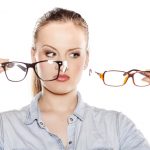How The Sun Can Harm Your Eyes And What To Do About It
The Danger Of UV Radiation To Your Eyes
With summer around the corner, many of us look forward to spending a lot of time with family and friends outdoors. But before we head out, we need to make sure we’re protecting our eyes from the sun’s UV rays, with sunglasses for our eyes.
Why We Need Sunglasses
We all know that staying outside too long without sunscreen can result in painful sunburns, but did you know that our eyes can be damaged by too much sunlight? The sun’s UV-A rays penetrate all the way to our retinas and can lead to macular degeneration (loss of central vision), and UV-B rays affect the cornea and lens, causing corneal sunburns and increasing the risk of developing cataracts.
To protect your eyes from UV radiation, sunglasses should block 100 percent of UV rays and also absorb most HEV rays. Sunglasses with a wraparound style offer the best protection because they reduce stray sunlight reaching your eyes from above and beyond the periphery of your sunglass lenses.
Risk Factors In The Outdoors
Anyone who spends time outside is at risk for UV radiation exposure. Some of the factors that can cause health risks are:
- Altitude: UV levels are greater at higher altitudes.
- Geographic location. UV levels are greater in tropical areas near the earth’s equator. The farther you are from the equator, the smaller your risk.
- Hours of the day. UV radiation levels are higher when the sun is high in the sky, typically from 10 a.m. to 2 p.m.
- Setting. UV radiation levels are greater in wide open spaces (with no shade), especially on highly reflective surfaces like water or snow.
Did you know that, UV exposure can almost double when UV rays are reflected from the snow? - Medications. Certain medications, such as tetracycline, sulfa drugs, birth control pills, diuretics and tranquilizers, can increase your body’s sensitivity to UV and HEV radiation. Be sure to ask your doctor if you need to take extra precautions.
Surprisingly, cloud cover doesn’t affect UV levels that much. Even on a cloudy, overcast day, your risk of UV exposure can still be high. This is because UV can penetrate clouds.
3 Considerations For Buying Sunglasses To Protect Your Eyes From The Sun:
UV Protection:
It’s important that your sunglasses provide 100 percent UV protection. This will shield your eyes from the sun’s harmful UV rays that can cause long-term eye damage and even permanent vision loss. Don’t assume cheap sunglasses provide this level of protection, even if a sticker on the lenses says, “blocks UV.”
Optical Quality:
Cheap sunglasses might seem to provide clear vision when you first try them on; but after you wear them a full day, you might experience eye strain if the optical quality of the lenses is less than it should be. This can be due to the inexpensive type of lens material used and possible warpage of the lenses in the frame.
Impact Resistance:
Sometimes, lenses in cheap sunglasses don’t provide the level of impact resistance that meets U.S. standards. Don’t take chances. For the best impact resistance, choose lightweight polycarbonate lenses.
Don’t fall for offers of cheap sunglasses unless you can verify the lenses provide the UV protection, optical quality and durability found in more expensive sunglasses.
We’re here to make sure you eyes are protected indoors and outside. Please call us if you have any questions or eyecare needs!





